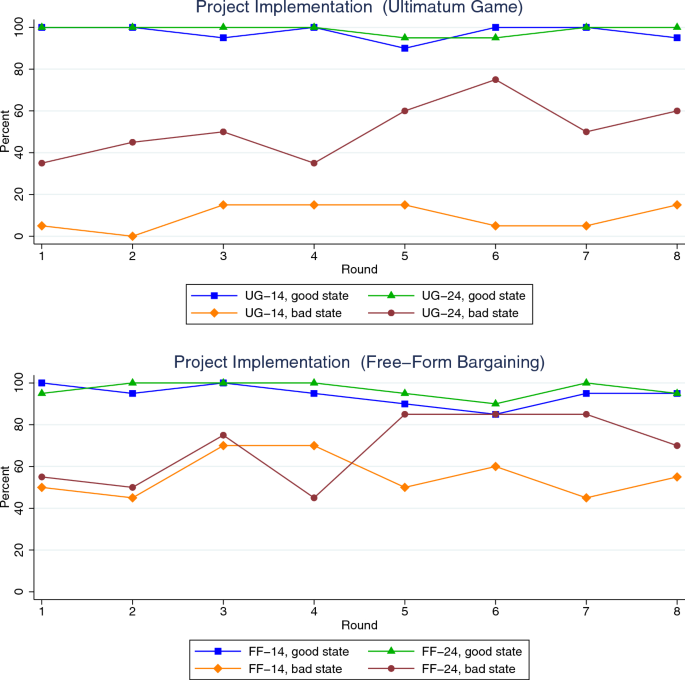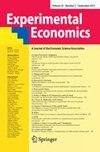信息不对称和外部性条件下的契约研究
IF 1.7
3区 经济学
Q2 ECONOMICS
引用次数: 0
摘要
摘要:本文研究了存在外部性和信息不对称情况下的合同谈判。在我们的设置中,玩家A执行一个对玩家B具有积极外部影响的项目总是事后有效的。然而,参与人A拥有关于实施该项目是否符合其自身利益的私人信息,即使没有与参与人B达成协议。从理论上讲,如果外部性较大,总是可以达成事后效率协议,而如果外部性较小,则并非如此。我们改变外部性的大小和议价过程。实验结果与理论预测基本一致。然而,即使外部性很大,玩家也无法在相当一部分观察中实现事后效率。这一发现既适用于最后通牒博弈讨价还价,也适用于具有自由形式沟通的非结构化讨价还价。本文章由计算机程序翻译,如有差异,请以英文原文为准。

Contracting under asymmetric information and externalities: an experimental study
Abstract We investigate contract negotiations in the presence of externalities and asymmetric information in a controlled laboratory experiment. In our setup, it is commonly known that it is always ex post efficient for player A to implement a project that has a positive external effect on player B . However, player A has private information about whether or not it is in player A ’s self-interest to implement the project even when no agreement with player B is reached. Theoretically, an ex post efficient agreement can always be reached if the externality is large, whereas this is not the case if the externality is small. We vary the size of the externality and the bargaining process. The experimental results are broadly in line with the theoretical predictions. However, even when the externality is large, the players fail to achieve ex post efficiency in a substantial fraction of the observations. This finding holds in ultimatum-game bargaining as well as in unstructured bargaining with free-form communication.
求助全文
通过发布文献求助,成功后即可免费获取论文全文。
去求助
来源期刊

Experimental Economics
ECONOMICS-
CiteScore
4.10
自引率
8.70%
发文量
40
期刊介绍:
Experimental methods are uniquely suited to the study of many phenomena that have been difficult to observe directly in naturally occurring economic contexts. For example, the ability to induce preferences and control information structures makes it possible to isolate the effects of alternate economic structures, policies, and market institutions.Experimental Economics is an international journal that serves the growing group of economists around the world who use experimental methods. The journal invites high-quality papers in any area of experimental research in economics and related fields (i.e. accounting, finance, political science, and the psychology of decision making). State-of-the-art theoretical work and econometric work that is motivated by experimental data is also encouraged. The journal will also consider articles with a primary focus on methodology or replication of controversial findings. We welcome experiments conducted in either the laboratory or in the field. The relevant data can be decisions or non-choice data such as physiological measurements. However, we only consider studies that do not employ deception of participants and in which participants are incentivized. Experimental Economics is structured to promote experimental economics by bringing together innovative research that meets professional standards of experimental method, but without editorial bias towards specific orientations. All papers will be reviewed through the standard, anonymous-referee procedure and all accepted manuscripts will be subject to the approval of two editors. Authors must submit the instructions that participants in their study received at the time of submission of their manuscript. Authors are expected to submit separate data appendices which will be attached to the journal''s web page upon publication. Officially cited as: Exp Econ
 求助内容:
求助内容: 应助结果提醒方式:
应助结果提醒方式:


